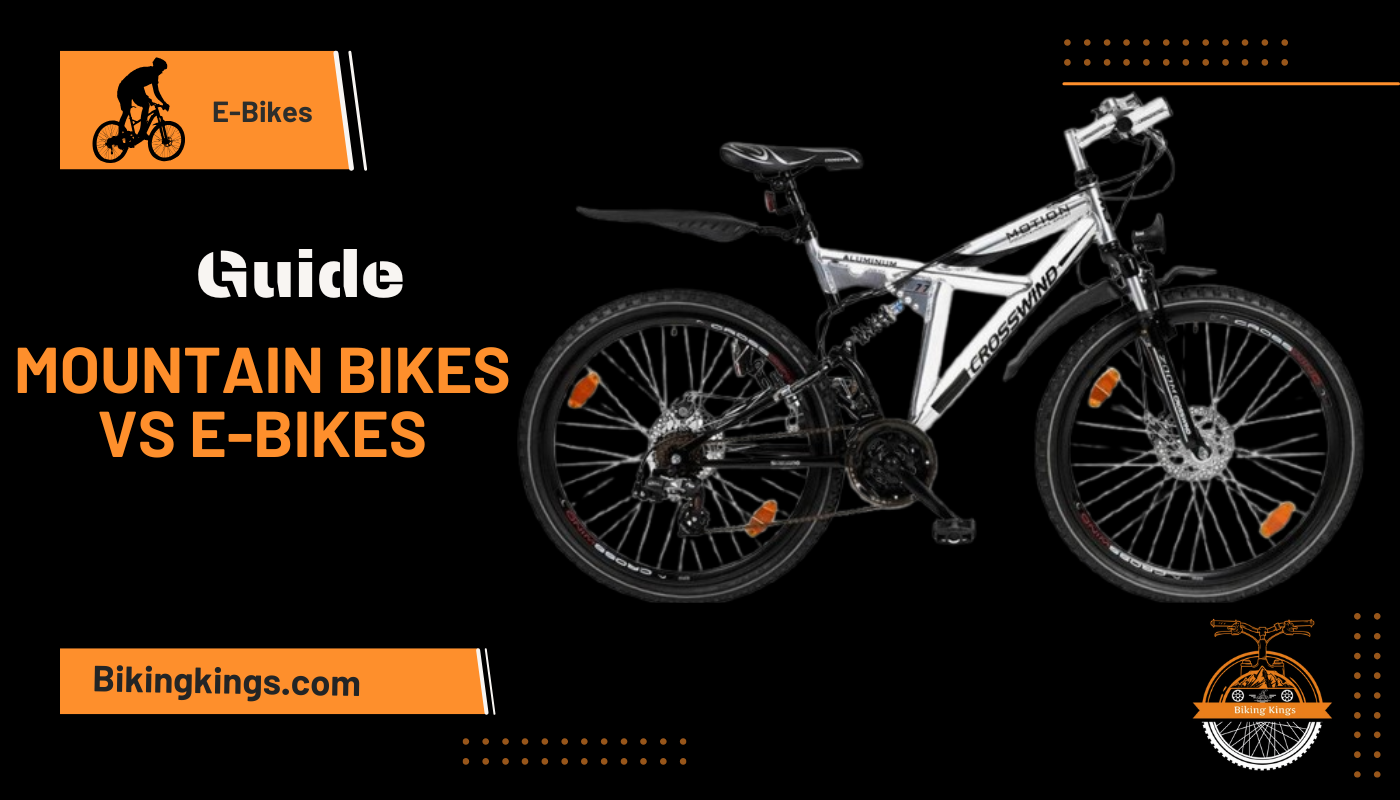When deciding between a mountain bike (MTB) and an electric mountain bike (e-MTB), it’s important to understand the key differences, their benefits, and which one aligns better with your needs. Both types of bikes are built for outdoor exploration and adventure, but they cater to different preferences and riding styles. In this article, we’ll delve into the main aspects of mountain bikes and e-bikes, and help you choose the best one based on your goals.
Mountain Bikes for Urban Riding
While mountain bikes are designed for rugged terrains like mountains and trails, they can also be adapted for urban environments. With their larger tires and robust frames, mountain bikes offer stability and comfort on uneven city roads. However, they may be bulkier compared to urban-specific bikes, which might impact speed and agility on paved streets.
Pros for Urban Riding:
- Durability: Designed to withstand rough conditions.
- Comfort: The suspension system absorbs shocks, ensuring a smoother ride over potholes and curbs.
- Versatility: Works well in parks, trails, and urban environments.
Cons for Urban Riding:
- Weight: Heavier than traditional road bikes, making them less ideal for longer city commutes.
- Speed: Slower compared to road bikes due to thicker tires and added weight.
Mountain Bike vs E-Bike: What’s the Difference?
The debate between mountain bikes and e-bikes often centers on the motor assistance offered by e-bikes. E-bikes feature a battery-powered motor that helps with pedaling, making steep climbs and long distances easier with less physical exertion. In contrast, mountain bikes rely entirely on human power, offering a more traditional cycling experience.
Disadvantages of E-Bikes
While e-bikes have many advantages, they come with certain drawbacks. Here are some common issues associated with electric mountain bikes:
Side Effects of E-Bikes:
- Battery Dependency: E-bikes rely on a charged battery, which can limit your riding range and require regular recharging.
- Heavier Weight: The motor and battery add significant weight, making the bike harder to handle when the battery runs out.
- High Maintenance Costs: The electric components of e-bikes require more frequent and expensive repairs compared to traditional bikes.
Limited Workout: Since e-bikes provide motor assistance, riders may not achieve the same level of physical exercise as with a mountain bike.
Advantages of Mountain Bikes
Mountain bikes offer several benefits, especially for those who love the thrill of off-road adventures. Here are some of the top advantages of riding a traditional mountain bike:
Good Effects of Mountain Bikes:
- Better Physical Workout: Riding a mountain bike provides a full-body workout, building strength, endurance, and cardiovascular health.
- No Battery Hassle: With no reliance on batteries, mountain bikes are always ready to ride, making them more convenient for spontaneous trips.
- Eco-Friendly: Mountain bikes produce zero emissions without the need for batteries or motors.
Improved Technique: Riding a traditional mountain bike helps develop better balance, coordination, and bike-handling skills
ℹ️ Be cautious with your assistance use on hazardous technical sections – the bike’s heavyweight, combined with its immense power, could lead to a nasty accident if you aren’t careful or don’t have the strength to cope with it.
Mountain Bikes vs Regular Bikes: What’s the Difference?

Mountain bikes differ from regular bikes in several ways. Regular bikes, often referred to as road bikes, are optimized for speed and efficiency on paved roads, while mountain bikes are built for off-road use. Here’s a breakdown of the key differences:
Differences:
- Tires: Mountain bikes have thicker, knobby tires designed for traction on rough terrains, while regular bikes feature thin, smooth tires for speed.
- Suspension: Mountain bikes typically have front or full suspension to absorb shock from rough trails, while regular bikes have minimal suspension, focusing on speed on flat roads.
Frame Geometry: Mountain bikes have a more upright riding position for better control on uneven surfaces, while regular bikes are built for aerodynamic efficiency.
The Value of Mountain Bikes
Why Riding a Mountain Bike Isn’t Cheating
Some argue that mountain biking isn’t just a physical activity, but a true test of endurance, agility, and mental toughness. While e-bikes can make climbs easier, many enthusiasts believe that mountain biking offers a purer connection to the outdoors and a more intense workout.
Impacts of Mountain Bikes on People
Mountain bikes play a significant role in improving physical and mental well-being. The sport offers cardiovascular benefits, helps build muscle strength, and reduces stress. Riding on trails also provides an opportunity to connect with nature, making it a great escape from the daily grind.
Building Health and Community
Mountain biking can serve as a community-building activity. Many enthusiasts ride in groups, attend local events, or join mountain biking clubs. These communities foster friendships and support for both beginners and seasoned riders.
Mountain Bikes Help Indulge in the Beauty of Nature
Riding a mountain bike allows you to explore the beauty of nature in ways other activities can’t. Whether it’s mountain ranges, forests, or rugged coastlines, mountain biking offers a dynamic and immersive way to enjoy the outdoors.
How to Use Mountain Bikes to Enjoy the Outdoors
Mountain biking is an excellent way to explore new landscapes. Whether you’re seeking an adrenaline rush or a peaceful retreat, cycling through nature gives you a unique perspective of the world around you.
Bike-Packing with Mountain Bikes
Bike-packing involves long-distance cycling where riders carry their camping gear and supplies. Mountain bikes are perfect for bike-packing due to their ability to navigate rough terrain and their durability over extended periods.
Benefits:
- Durability: Can withstand extended travel over tough landscapes.
- Versatility: Suitable for both road and off-road use during multi-day trips.
Mountain Bikes for Injury Recovery
For those recovering from injury, mountain biking provides a low-impact form of exercise that can improve mobility, strength, and mental resilience. The adjustable intensity of cycling allows you to ease back into physical activity.
Low Impact Exercise with Mountain Bikes
Mountain biking is an effective low-impact workout. The sport helps build strength in the legs, core, and cardiovascular system, all while minimizing strain on the joints compared to other forms of high-impact exercise.
Incorporating Mountain Bikes in Your Recovery Routine
Incorporating mountain biking into your recovery routine can be a great way to regain physical function while enjoying the outdoors. Starting with flat trails and gradually progressing to more challenging routes can help improve endurance and mobility over time.
E-Bikes vs Mountain Bikes: Should You Choose One Over the Other?

Deciding between an e-bike and a mountain bike depends on your specific needs and preferences. If you enjoy a good workout and want to push your limits, a traditional mountain bike is the best choice. If you need help with hills or want a less strenuous ride, an e-bike could be a better fit.
What’s the Point of Mountain Bikes vs E-Bikes?
While mountain bikes offer a purely physical challenge, e-bikes take away some of the physical strain. If you want to ride longer distances or tackle more difficult terrain with less effort, an e-bike is a great option. However, if you’re looking for a challenging experience, traditional mountain bikes might be the way to go.
Can I Turn My E-Bike into a Mountain Bike?
Converting an e-bike into a mountain bike is technically possible, but it requires a series of modifications, including changing the tires, suspension, and frame to make it suitable for rugged terrain.
Practical Benefits of Mountain Bikes
Why Many Are Switching to Mountain Bikes for Commuting
Many urban commuters are switching to mountain bikes for their durability and ability to handle various terrains. Mountain bikes also offer a smoother ride compared to regular bikes over potholes and uneven surfaces.
Faster Than a Conventional Bike
Mountain bikes, despite being bulkier, can be faster over difficult terrains. Their larger tires provide better traction and control, allowing for more speed on rugged trails.
Environmentally Friendly
Mountain biking is an eco-friendly mode of transport that reduces the carbon footprint compared to driving. E-bikes also offer an environmentally conscious alternative to cars, though their battery disposal needs to be managed carefully.
Budget-Friendly
While mountain bikes can be an investment, they often have fewer ongoing maintenance costs compared to e-bikes, which require regular charging and battery maintenance.
Opportunity to Explore
Mountain bikes open up opportunities to explore both natural and urban environments, offering freedom and adventure with each ride.
Larger Selection of Mountain Bikes
Mountain biking offers a broader selection of bike styles, from full suspension to hardtail models, providing options for various riding preferences and budgets.
Final Thoughts
Choosing between a mountain bike and an e-bike ultimately depends on your personal preferences, fitness level, and riding style. If you’re looking for a traditional, physically demanding experience, a mountain bike may be the best option. However, if you want a more accessible ride with less effort, an e-bike could be the perfect solution.


